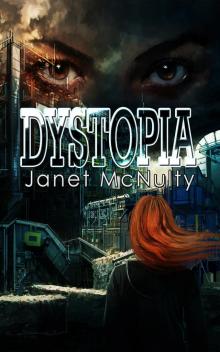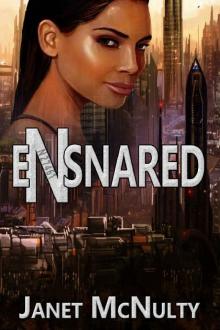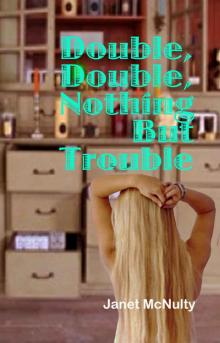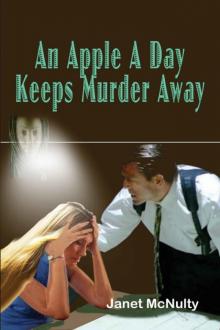- Home
- Janet McNulty
Ensnared (Enchained Trilogy Book 2) Page 14
Ensnared (Enchained Trilogy Book 2) Read online
Page 14
Renal opens his door and steps out of the transport. I do the same. The moment I touch the door handle, and bit of burnt red touches my hand, turning my walnut-colored skin crimson, and as I step out, I glance to the source of the light, noting that dawn has arrived as the sun peeks over the horizon, shedding the first rays of its magnificence on the world, but even though it should bring me warmth, all I feel is coldness as the barrels of weapons glare at me, ready to fire if their masters will it. Once again, I take my cure from Renal as he steps forward with slow deliberate steps, and I do the same, keeping my hands where they can be seen.
“Gentlemen, gentlemen,” says a jovial voice as an arbiter steps forth with the stripes of a commandant on his shoulders.
The guards relax their weapons, but remain ready to respond should Renal or I try anything while the driver remains in the transport.
“You must be Arbiter Noni,” the man says to me.
“Yes, sir,” I reply, saluting him.
“Commandant Firth at your service,” he introduces himself, “and…” He pauses as he looks at Renal.
“Lieutenant Renal.”
“Welcome!” Commandant Firth waves his arms. “Come. Don’t mind them”—he points at the guards who still watch us with icy stares, ready to attack us should we try anything—“they won’t bite.”
Something tells me that biting us is not what they have in mind, as we walk past the guards and their helmeted heads turn in our direction as we move, keeping their eyes fixed upon us.
With each step, the sun rises higher in the sky, turning the red dirt into orange, before lighting up the sky enough for the dirt and the grass around us to shine bright in their natural colors. We follow Commandant Firth up a set of steps built into the side of a hill as he leads us to into the compound, and as I reach the top, my eyes widen at the sight the lies before me: fields upon fields of crops stretch out before, filling every inch of land as a massive wall surrounds it, that seems to stretch on for miles, and as I remains transfixed, the suns rays move over the fields lighting up tomatoes, corn, wheat, beans, carrot stalks, peppers, radishes, blueberries, strawberries, cherry trees, an apple grove, parsnips, and grape vines. Further onward are fences that circles around the crops as shapes strolls back and forth behind them and I wonder if they are livestock.
“Magnificent, isn’t it?” says Commandant Firth.
“Yes, sir,” I reply, unsure of what else to do.
“Welcome to the farms!”
Commandant Firth walks forward, finding some steps that lead down into the fields themselves, and both Renal and I follow, knowing what is expected of us.
“I must say that I was surprised to receive a special communication from President Tapiwa, regarding your arrival, but I guess that it is important for even arbiters to know where their food comes from.”
“I do as I am told,” I say when I realize that Commandant Firth expects me to shed light upon my presence here, but in all honesty, I have no idea why I am here. Tapiwa said that I was to go to the mines. She never mentioned a detour to the farms, except… Chase is here. I had sent him here, and he had not returned to the manor, meaning that he should still be here. Does she know about him? Did she know about the incident that landed him here, and my lenient punishment, as a way of sparing him?
Shadows move from the edges of the fields, closing in on the crops with their shovels, rakes, and scythes, and it take a moment before I realize that these are people, and the closer I look, the more I realize that they are plebeians and only plebeians. Some of the places I had gone to had a mixture of both plebeians and citizens who had broken Arelian law, but here, only plebeians work the fields while their overseers, Arelians in green uniforms, signifying that they work for the agricultural sector, walk the fields directing the plebian field hands. I watch as they move into the fields or the orchards and start weeding or chipping away at the hard dirt to make a space for a new plant, while arbiters line the edges—some wander through the fields as well—keeping watch on everyone and everything, ready to act should trouble arise.
Commandant Firth continues down the steps, which are nothing more than metal grates shoved into dug out sections of the slight hill and filled in with loose gravel, mimicking steps, and out boots clomp with each step until we reach the rock-solid ground at the bottom.
“Here is where we grow the food that feeds all of Arel. The fields are plowed every season,” Commandant Firth says as he leads us down a row of legumes while the sounds of shovels hitting dirt surround us, “crops are rotated—there is never a time when we are not toiling over the land.”
“What about winter?” I ask.
Commandant Firth smiles, pleased that I asked a question, for which he can showcase how well he runs this place. “Let me show you.”
Renal and I follow the commandant to the edge of the field—a few eyes glance in our direction, before diverting themselves back to their work, while hoping to go unnoticed—as he leads us down a path as the sun’s warmth envelops us while we walk until we come to an overgrowth of apple trees and tall, transparent buildings, with beads of moisture covering their walls, allowing no one to peek inside at the treasures contained within. As the commandant approaches a doorway to one of these buildings, a plebeian opens it for him, allowing us through. It’s as though I have just walked into a sauna as an intense wave of moisture hits me, covering my uniform, causing little droplets of water to form on the sleeves of my jacket, but the moment the leaf of a plant touches my cheek, I pause. All around me are various plants, just like the ones outside, but are contained by pots and either hang from the ceiling or are on shelves. Lush, green leaves holding bountiful fruit surround me, plunging me into a sort of edible jungle as I wander around the greenhouse, observing all of the plants and the plebeians that tend them.
“These greenhouses,” say commandant Firth, “are what get us through the winter. They run year-round, and without them, the people of Arel would starve.”
Renal gives the commandant a glance as though to warn him to not embellish his role in feeding Arel too much, and the commandant rethinks his words.
“We try to grow most of what we need outside, but sometimes, it isn’t enough. This is one of thirty greenhouses. They are all climate controlled. There is a sprinkler system that runs through the ceiling here”—he points upward, and for the first time, I notice a series of pipes with sprinkler heads attached to them lining the ceiling of the greenhouse—“which is on a timer. Every half hour, it turns on and waters the plants. They crops in here are tended every day and with the utmost of care.”
Commandant Firth leads us to the other end of the greenhouse where a door is and through another door to the outside. The moment I cross the threshold, I cough from the sudden dryness of the air, but manage to swallow enough spit so as to moisten my throat and prevent myself from coughing anymore, as it can be seen as a sign of weakness and weakness is never permitted.
“The livestock we keep contained over there,” says Commandant Firth. “We have cows and chickens and we keep them separated.”
The mooing of a cow grabs my attention and I turn in time to watch a plebeian pour water into a trough for it to drink from, while others go into the chicken coops with baskets, coming out a few minutes later with eggs. “What is that over there?” I ask, pointing at a black building with no windows, not discernable doors, and looking as though uninvited guests are not welcomed.
“The slaughterhouse,” says Commandant Firth. “We will not be going there.”
It appears that I am not to see everything here. We walk underneath an arch of branches, hanging low from the apples that weigh it down, as the commandant leads us to another part of the massive farm, ad I find myself glad to be in the shade and away from the increasing warmth of the sun, but as we continue on, something gnaws at me, and I find myself wondering where we are going. A quick peek at Renal tells me that he is also uneasy as his eyes dart from vantage point to vantage point, but he never says a
nything, preferring the advantage of silence. As we continue to follow Commandant Firth to an unknown part of the massive farm, I start to open my mouth to inquire where we are going when I notice a man, about my age, leaning over a shovel in the bright sunshine as he rams it into the ground, scooping away dirt. Is it? The hair, the build, it has to be Chase, but I cannot see his face. My heart skips, excited to know that he is alive, but angered at the fact that he is still here. Gwen has not stopped crying since he left, and I cannot bear the fact that she carries that loneliness with her. I open my mouth to ask about that area, just so the commandant will take us closer to Chase, but I needn’t bother because it seems as though Commandant Firth can read my mind and diverts his trek through the apple grove to the field beyond and the mand with the shovel. The closer we get, the more my heart pounds from excitement and fear. I take in a deliberate, yet slow, breath, willing my nerves to quiet themselves as I do not want to attract unwanted attention, but the closer we get, the harder it becomes.
An arbiter strolls past the man with the shovel and appears to say something to him. Curious, I stop, wondering what is going on, but before I can ponder the interaction between the arbiter and Chase, he runs off, throwing the shovel to the side, and it kicks up a bit of dust as it hits the ground, an heading for the wall. He sprints, ignoring the shouts and the commands, but something about this seems off. The arbiter that had spoken to him just stands there watching the proceedings as Chase runs before it hits me: this is a set up. I start to open my mouth, start to yell, but Renal stops me.
“Escapee!” he shouts, which seems to force the surrounding arbiters into action, as though they were waiting for someone to day something.
I watch, helpless, as they raise their weapons and fire—no warning, nothing—and my heart stops as the man drops to the ground, unmoving. I cannot stay here as he lays dying. I can’t… I take off, ignoring Renal’s attempts to stop me, and stop as one of the guards flip the fallen man with his boot and come to a halt when I see the face. It’s not Chase. Relieved, release the air I have been holding in my lungs, glad that it is not him lying dead on the ground, but that relief turns to anger and bewilderment. This was meant for me. Every fiber in my being tells me that this little show was meant for me as a warning, a test, or both. My fists clench, but before I can go any further, Renal appears by my side and grips my arm, warning me to reign in my temper.
“You seem anxious,” says Commandant Firth in a nonchalant tone, as though he has been studying my actions, and for a brief moment, I wonder whom he will be reporting this to. “Or is that relief I see.”
“Fury,” I reply. “Are you incapable of keeping your plebeians in line. One runs off and your arbiters act as though they are sleeping on the job. He should have been dealt with the moment he dropped his shovel.”
The commandant studies my actions, but I keep the tone of my voice even, but harsh, the sort of harshness one expects an arbiter to have, but I can tell he is not buying my response. To sell it, I stalk over to the dead plebeian on the ground. I have no idea who he is, but am convinced that he was told to run just so he could be sacrificed. With the commandant watching, I swing my foot back and ram it into the side of the dead plebeian’s head, causing it to snap before approaching the commandant. “One less piece of plebeian trash is of no consequence, but your lack of control over this is disturbing. Perhaps I shall include in my report to President Tapiwa.”
The commandant’s face twitches. If this was all for my benefit, Commandant Firth seems to not want any of it to reflect upon him. “There will be no need. I will ensure that such an incident never happens again.”
I keep my eyes planted on him, hoping to make him sweat underneath the uniform of his, but Renal cuts it short.
“Is there anything else, commandant? We do have a schedule to keep.”
“Yes, of course,” replied the commandant as he leads us away from the dead plebeian and back to where our transport is parked.
As we head back, curious eyes glance at us, making certain not to linger for too long as the people they belong to keep their mouths sealed, but unease flows over me as we march through the fields until we reach the steps. I do not wait to be told what to do and go up them in a hurry, making my way to the transport where the driver waits for both Renal and me.
“Thank you, Commandant,” Renal says as we get inside the transport and the driver starts the engine.
Commandant Firth says nothing as the vehicle heads for the gates, which open up just enough to let us through, before sealing behind us, and as we drive away, the feeling that the artillery on the walls remains trained on us refuses to leave me. I force myself to remain facing forward, instead of sneaking a look back as the gates disappear in the distance, but despite my anxiety about what the mines will brings, only one thing remains on my mind: Chase, where are you?
Chapter 11
The Mines
A few wisps of clouds brush the sun, darkening everything for a second until they pass, as the transport rolls into the mines, past armed guards ready to fire upon anyone who proves to be a threat. I remain facing forward, not wanting to appear too interested in the people working the mines, but curiosity keeps a tight hold on me, so I move my eyes toward the window, just for a quick peek. Worn eyes return my gaze, filled with hollow ambition, void of any desire to do more than what is required of them; their despondency gnaws at me, and a lump forms in my throat as I am reminded of the plebeian quarters where the same misery resides. A mural of wretched faces pass by my window, poised and positioned just so with grungy rags tied around their mouths in a pathetic attempt to prevent them from breathing in the choking clouds of dust, as though an artist placed them there to capture and convey just the right amount of emotional evocation. Sunken cheeks creep by the window as a man, coated in ashen dust, flicks his gaze toward the transport before jerking it away and going back to his work. I swallow another lump. The abasement of this place radiates from each person here, from the darkest corner deep within the mine to the brightest spot outside, but not even the sun can comfort this place as its light dwindles when it touches the dirt, unable to bring about any form of solace.
The transport stops. I take a quick look at Renal who remains erect and unmoving, just like I have seen Commander Vye do so many times, before opening the door and stepping out of the protected interior of the vehicle and into my newest assignment. A man marches up to us, his quick steps leaving deep impressions within the sifting soil, surrounded by three guards dressed in full armor helmets that conceal their faces. Remaining still, I make certain to not give the guards any excuse to shoot me. A woman’s scream snaps my attention. I turn, unable to stop myself, and find a woman, a citizen, laying on the ground with her arms in front of her, begging the guard beating her with a switch to stop. I shift my foot to confront it when a hand grips my arm, stopping me; its force unnerves me, and I look up into the Renal’s eyes, warning me to stay out of it.
“Welcome!” says the man marching up to us, and the creased lines of his black uniform stand out in the sunlight. “I am Commandant Gant, and you must be Arbiter Noni.” He wraps my hand in his own and the grin on his face makes the misshapen dark spot on his ebony cheek—a sign that he has spent a fair amount of time outdoors—wrinkle.
“Thank you,” I say, unsure of how to respond.
“This way,” the commander waves us forward, taking the lead as he walks further into the compound amidst a symphony of shovels hitting dirt, pickaxes striking rock, and the squeaking wheels of the minecarts ambling down their tracks, overloaded with treasures.
He leads us to a haphazard structure that looks as though it had been slapped together with little thought to safety or durability as its roof slumps in the middle from neglect, while the posts supporting the entrance tip inward toward each other. I study it a moment, doubtful if it will remain standing while we are inside, but Commandant Gant stomps through the sliding doors, encrusted with dirt, coloring them brown, and the rest of us
follow. A few seconds pass for my eyes to adjust after being in the sunshine, and I twist on the spot, taking in the wall-sized monitors bursting with images of workers slumped over, weighted down by their tools, as they trudge into the darkened caverns of the underground in search of treasure coveted by Arel. The outside of the building may have appeared to be a hermit’s humble dwelling, but the inside is awash in Arel’s glorious technology, as arbiters sit in front of monitors, each with a headset on, speaking into it, communicating with the guards that patrol the mines, keeping a careful watch on those under their supervision. Inaudible messages meld with the whomp-whomp of the fan spinning above us in its meager attempt to stir the air to prevent the room from feeling hot.
A familiar face on a monitor catches my attention. Is that… It cannot be. Did he see me when I first pulled into the mines and follow me to the command center where he stands, trying to avoid the guards while waiting to see if he saw who he thinks he saw? But he is supposed to be…
“Arbiter Noni!”
I jerk away from the monitor, remembering where I am and why I am here as Commandant Gant’s voice bursts through my all-consuming thoughts. “Commander,” I say, having no idea what he had just asked me.
“The commander,” Renal says, saving me from embarrassment once again, “is interested to know your opinion on the worker’s productivity.”
I turn away from the monitor, from the face that seized my attention, formulating the words needed to appease the commander—I do not want to appear as though I am taking over his job—while saving face in front of the others within the room. “You have quite the setup here, commander,” I say in a pleasant voice, “but you know why I am here.”
That answer should force Commandant Gant to repeat what he had said while I was distracted. It does. “As I was saying, we are a copper mine, as you know, our productivity is down. The presidents are not happy and if we fail to get productivity up…”

 Sugar And Spice And Not So Nice
Sugar And Spice And Not So Nice Dystopia
Dystopia Ensnared (Enchained Trilogy Book 2)
Ensnared (Enchained Trilogy Book 2) Double, Double, Nothing But Trouble (A Mellow Summers Paranormal Mystery Book 10)
Double, Double, Nothing But Trouble (A Mellow Summers Paranormal Mystery Book 10) Janet McNulty - Mellow Summers 05 - Oh Holy Ghost
Janet McNulty - Mellow Summers 05 - Oh Holy Ghost Janet McNulty - Mellow Summers 02 - Frogs, Snails, and a Lot of Wails
Janet McNulty - Mellow Summers 02 - Frogs, Snails, and a Lot of Wails Janet McNulty - Mellow Summers 03 - An Apple a Day Keeps Murder Away
Janet McNulty - Mellow Summers 03 - An Apple a Day Keeps Murder Away Janet McNulty - Mellow Summers 08 - Trick Or Treat Or Murder
Janet McNulty - Mellow Summers 08 - Trick Or Treat Or Murder Janet McNulty - Mellow Summers 01 - Sugar And Spice and Not So Nice
Janet McNulty - Mellow Summers 01 - Sugar And Spice and Not So Nice Roses Are Red; He's Dead (A Mellow Summers Paranormal Mystery Book 9)
Roses Are Red; He's Dead (A Mellow Summers Paranormal Mystery Book 9) Janet McNulty - Mellow Summers 07 - Two Ghosts Haunt a Grove
Janet McNulty - Mellow Summers 07 - Two Ghosts Haunt a Grove Janet McNulty - Mellow Summers 04 - Three Little Ghosts
Janet McNulty - Mellow Summers 04 - Three Little Ghosts